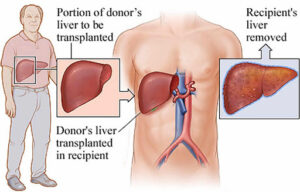Many patients with liver ailments such as Hepatitis B-C, metabolic disorders, autoimmune hepatitis, and biliary atresia, are advised by doctors for liver transplantation. A liver transplant in India is one of the sought-after surgeries because of the phenomenally successful outcomes.
A liver transplant is a surgical procedure in which a portion of a healthy liver from a donor is used to replace a diseased liver. The best liver treatment hospitals in India can accommodate a large number of patients for each surgical procedure.
Additionally, when compared to other countries, the liver transplant cost in India is significantly lower. In fact, it is only a fraction of what it costs in other countries such as the United States and the United Kingdom.

Functions of Liver
The liver is located in the top right abdominal corner. It controls the vast majority of blood chemical levels. The liver also secretes bile, a yellow translucent fluid.
Lipids or fats must first be broken down by bile in order to be digested and absorbed more conveniently.
The liver cleans this blood while also dissolving, balancing, and producing substances that the body requires. Additionally, it transformed blood-borne medications into more digestible forms that the body can use.
Liver diseases include a wide range of conditions that impair or cease the liver’s ability to function. If a person has jaundice or has abnormal liver function test results, they may have liver disease and should visit their doctor. Some of the liver diseases have been mentioned below.
- Virus-related illnesses, such as hepatitis A,B, and C.
- Diseases caused by drugs, excessive alcohol consumption can cause liver damage.
- Cirrhosis and fatty liver.
- Liver cancer.
- Genetic conditions like Wilson disease and hemochromatosis.

Prime Causes of Liver Disease
There are various reasons for liver disease. Some of them have been mentioned below.
Immune system dysfunction
Autoimmune disorders, which develop when the immune system attacks certain body organs, may have an effect on the liver.
Infection
Viral and parasitic liver infections can cause inflammation and impaired liver function. The most common causes of liver infection are hepatitis viruses A, B, and C.
Genetics
Liver disease can develop from different substances building up in the liver as a result of a defective gene that an individual got from either one or both parents.
Other common causes of liver disease include the following:
● Chronic alcoholism.
- Fat accumulation in the liver (a fatty liver disease that is non-alcoholic).
Symptoms of Liver Disease
The liver disease typically doesn’t have overt symptoms or warning signs. If signs of liver disease do show, they may include the following:
- Abdomen-related swelling and discomfort.
- Body itch.
- A yellowish tint to the eyes and skin (jaundice).
- Swelling in the legs and ankles.
- Decreased appetite.
- Stool with a light color.
- Tendency to bruise easily.
- Constant fatigue.
- Vomiting or diarrhea.
How Does One Keep a Healthy Liver?
Since the liver is in charge of fat digestion, eating too much of it might exhaust the liver and prevent it from doing other tasks. Additionally, this has associations with fatty liver disease.
Limit your alcohol consumption. Alcoholism in excess overtime harms the liver and causes cirrhosis.
Drugs that are illegal can harm the liver. By avoiding these chemicals like cocaine and the PCP, the liver can perform its important functions unhindered.
When using multiple medications, use caution since some prescription drugs and herbal remedies may interact negatively. When alcohol and drugs are consumed together, the liver is put under a lot of stress.
The liver can also be harmed by airborne chemicals. When painting or using strong cleaning or gardening chemicals, it’s crucial to have a well-ventilated space and wear a mask.
It is imperative to get vaccinated before travelling to areas where hepatitis A or B may be prevalent. Keep in mind that malaria flourishes in the liver, and yellow fever can result in liver failure.
There is no vaccine against hepatitis C, therefore safe sex practices should be used.
Avoid coming into touch with blood and germs. It is also crucial that you avoid contact with someone else’s blood.
Treatments for Liver Diseases
A person’s therapy is determined by the doctor’s diagnosis. Some liver problems can be controlled by making lifestyle adjustments, like quitting drinking or losing weight.
This is typically a treatment strategy component involving ongoing liver function testing. Surgery or pharmacological therapy may be suggested for other liver conditions.
Liver transplant is the last resort and not all patients with liver problems need it, however it may be necessary in some cases.
Are Liver Conditions Curable? What is Their Success Rate?
Around 75% of people who have a liver transplant live to an average age. As a result, 75 people who have a liver transplant for any reason will live for at least five years.
The condition of the liver cannot be permanently cured. Nevertheless, depending on the underlying cause of the ailment, specific actions can be performed to stop the sickness from getting worse.
Acute liver failure occasionally responds to treatment, but it depends on the underlying cause. However, a liver transplant may be the sole option in some situations.
What Advantages Come with Liver Surgery or Treatments?
The advantages of liver therapy include:
- The patients’ lifespan is extended as a result.
- Enables a high quality of life.
- Absence of symptoms like fatigue, nausea, etc.
- Patients will resume leading regular lives.


